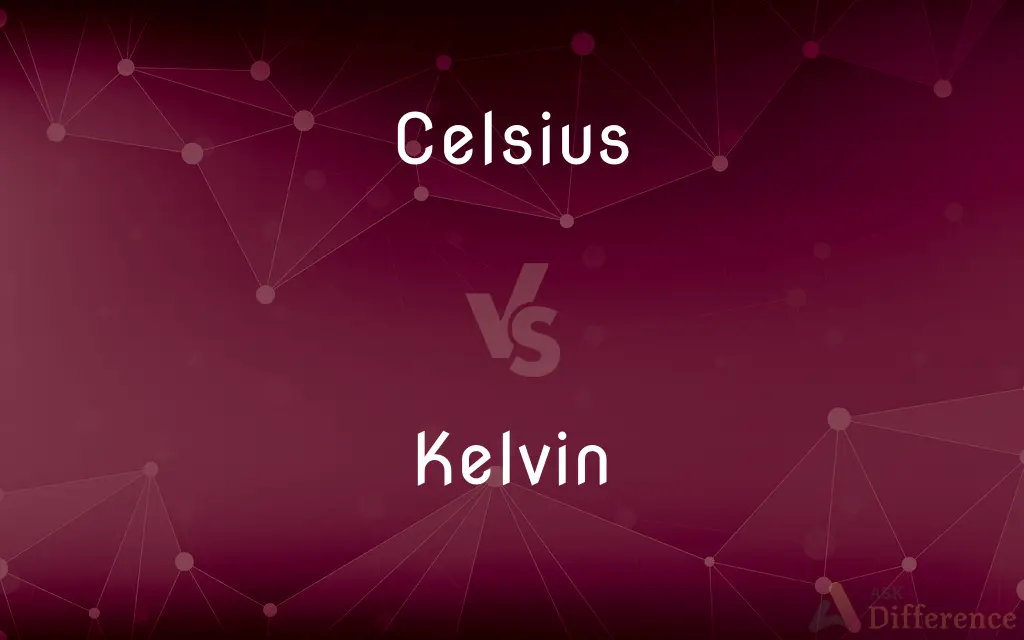Celsius vs. Kelvin — What's the Difference?
By Tayyaba Rehman — Updated on October 28, 2023
Celsius, based on water's freezing and boiling points, is used for everyday temperature; Kelvin, starting at absolute zero, is used in scientific contexts.

Difference Between Celsius and Kelvin
Table of Contents
ADVERTISEMENT
Key Differences
Celsius is a temperature scale based on the freezing point (0°C) and boiling point (100°C) of water at sea level. Kelvin, however, begins at absolute zero, the theoretical lowest possible temperature, and has units the same size as Celsius degrees.
The Celsius scale is commonly used in daily life and weather forecasts. Kelvin, on the other hand, is primarily used in scientific contexts, particularly in physics, where absolute temperatures are crucial.
One degree Celsius represents the same temperature change as one Kelvin. However, their starting points differ: 0°C is equivalent to 273.15K. This difference is essential for conversions between the two scales.
Celsius is widely used around the world, especially in non-scientific contexts. Kelvin's use is more specialized, often reserved for scientific experiments and calculations where extreme temperatures or absolute values are involved.
While both Celsius and Kelvin measure temperature, their contexts of use and reference points set them apart. Celsius is aligned with everyday experiences, while Kelvin provides a scientific standard starting from the theoretical extreme of cold.
ADVERTISEMENT
Comparison Chart
Reference Point
Based on water's freezing (0°C) and boiling points (100°C).
Starts at absolute zero (-273.15°C).
Usage
Common in everyday life and weather forecasts.
Primarily used in scientific contexts.
Unit Size
Same as Kelvin (1°C = 1K).
Same as Celsius (1K = 1°C).
Starting Point
Begins at the freezing point of water.
Begins at absolute zero, the coldest possible temperature.
Global Adoption
Widely adopted internationally for general use.
Used mainly in the scientific community.
Compare with Definitions
Celsius
A scale for measuring temperature where water freezes at 0°C.
It's 25°C outside, a perfect day for the beach.
Kelvin
A temperature scale starting at absolute zero.
Absolute zero is 0 Kelvin.
Celsius
Part of the metric system used worldwide.
The recipe calls for the oven to be set at 180°C.
Kelvin
Essential for thermodynamic calculations.
Calculating entropy requires temperatures in Kelvin.
Celsius
Commonly used in weather forecasting.
The weather report predicted a high of 30°C tomorrow.
Kelvin
Used as a scientific standard for temperature.
The chemical reaction occurred at 298 Kelvin.
Celsius
Also used in scientific contexts alongside Kelvin.
The laboratory experiment required a temperature of 37°C.
Kelvin
In the International System of Units, the base unit of thermodynamic temperature; 273.16 of the thermodynamic temperature of the triple point of water. Shown as "K".
Celsius
Swedish astronomer who devised the centigrade thermometer (1701-1744)
Kelvin
A unit interval on the Kelvin scale.
The interval between the freezing and boiling points of water is 100 kelvins.
Celsius
Marks the boiling point of water at 100°C.
Water boils at 100°C under standard atmospheric pressure.
Kelvin
Has only non-negative values.
Temperatures in space are often measured in Kelvin.
Celsius
The degree Celsius is a unit of temperature on the Celsius scale, a temperature scale originally known as the centigrade scale. The degree Celsius (symbol: °C) can refer to a specific temperature on the Celsius scale or a unit to indicate a difference or range between two temperatures.
Kelvin
The kelvin is the base unit of temperature in the International System of Units (SI), having the unit symbol K. It is named after the Belfast-born Glasgow University engineer and physicist William Thomson, 1st Baron Kelvin (1824–1907). The kelvin is now defined by fixing the numerical value of the Boltzmann constant k to 1.380649×10−23 J⋅K−1.
Celsius
Of or relating to a temperature scale that registers the freezing point of water as 0° and the boiling point as 100° under normal atmospheric pressure. See Table at measurement.
Kelvin
A unit of absolute temperature equal to 1/273.16 of the absolute temperature of the triple point of water. One kelvin degree is equal to one Celsius degree. See Table at measurement.
Celsius
Alternative case form of Celsius
Kelvin
Kelvin A temperature scale in which zero occurs at absolute zero and each degree equals one kelvin. Water freezes at 273.15 K and boils at 373.15 K.
Celsius
The Celsius thermometer or scale, so called from Anders Celsius, a Swedish astronomer, who invented it. It is the same as the centigrade thermometer or scale.
Kelvin
(usually as postpositioned adjective) A unit for a specific temperature on the Kelvin scale.
Ice melts above 273.15 kelvins.
Water boils above 373.15 kelvins.
Kelvin
The SI unit of temperature, defined as being 1/273.16 of the triple point of water; abbreviated K. The melting point of water at 760 mm pressure is 273.15 Kelvins, and the boiling point 373.15 Kelvins. One degree Kelvin is equal to one degree Centigrade, and
Kelvin
The basic unit of thermodynamic temperature adopted under the Systeme International d'Unites
Kelvin
British physicist who invented the Kelvin scale of temperature and pioneered undersea telegraphy (1824-1907)
Kelvin
Has units of the same size as Celsius degrees.
A change of 1 Kelvin is equivalent to a change of 1°C.
Common Curiosities
Is Celsius used globally?
Yes, Celsius is widely used around the world.
What is absolute zero in Kelvin?
Absolute zero is 0 Kelvin.
Is Celsius used in scientific research?
Yes, but Kelvin is often preferred for scientific accuracy.
What does 0°C represent?
0°C is the freezing point of water.
Can Kelvin be negative?
No, Kelvin does not have negative values.
How do you convert Celsius to Kelvin?
Add 273.15 to the Celsius temperature.
What's the boiling point of water in Kelvin?
It's approximately 373.15 Kelvin.
Is Kelvin used in everyday life?
Kelvin is rarely used in daily life; it's mainly for scientific purposes.
Is Celsius part of the metric system?
Yes, Celsius is a component of the metric system.
Why is Celsius popular for weather reports?
Celsius is relatable and easily understood by the general public.
Are Celsius and Kelvin degrees the same size?
Yes, a 1-degree change is the same in both scales.
Why don't we use Kelvin for weather?
Kelvin's starting point of absolute zero is not practical for everyday temperatures.
Can temperatures in Kelvin be fractional?
Yes, Kelvin can have decimal or fractional values.
Why is Kelvin important in physics?
Kelvin provides an absolute temperature scale crucial for physics calculations.
Is Fahrenheit related to Celsius and Kelvin?
Fahrenheit is a different temperature scale, not directly related to Kelvin but can be converted to and from Celsius.
Share Your Discovery

Previous Comparison
Ownership vs. Accountability
Next Comparison
Essence vs. SerumAuthor Spotlight
Written by
Tayyaba RehmanTayyaba Rehman is a distinguished writer, currently serving as a primary contributor to askdifference.com. As a researcher in semantics and etymology, Tayyaba's passion for the complexity of languages and their distinctions has found a perfect home on the platform. Tayyaba delves into the intricacies of language, distinguishing between commonly confused words and phrases, thereby providing clarity for readers worldwide.















































